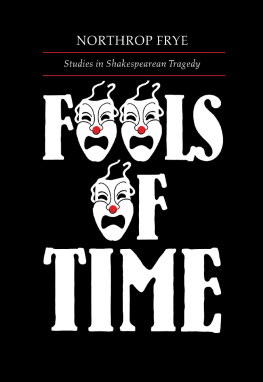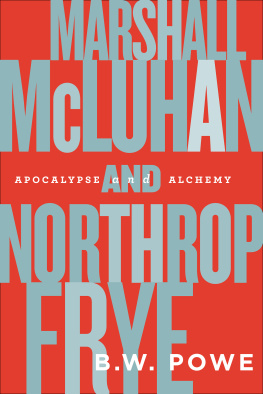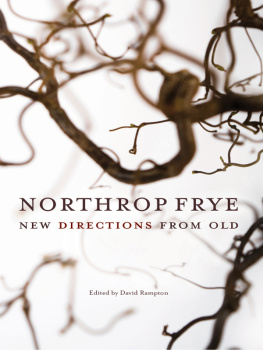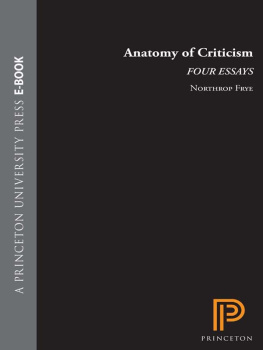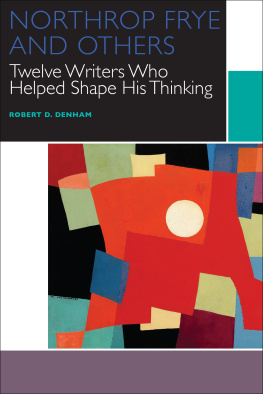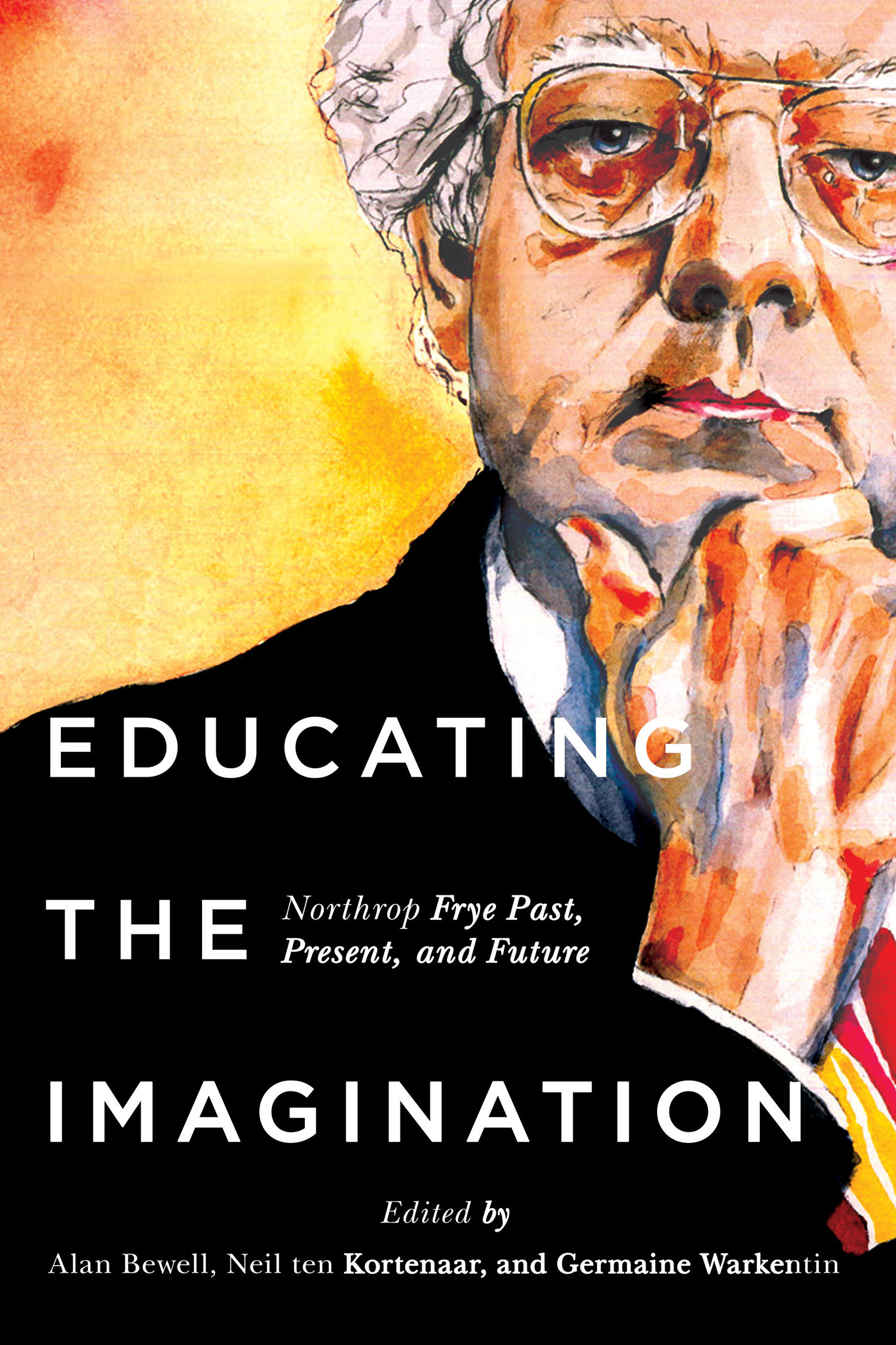EDUCATING THE IMAGINATION
Educating the Imagination
Northrop Frye Past, Present, and Future
Edited by
ALAN BEWELL, NEIL TEN KORTENAAR,
AND GERMAINE WARKENTIN
McGill-Queens University Press
Montreal & Kingston London Chicago
McGill-Queens University Press 2015
ISBN 978-0-7735-4572-4 (cloth)
ISBN 978-0-7735-4573-1 ( paper )
ISBN 978-0-7735-9736-5 ( e PDF )
ISBN 978-0-7735-9737-2 ( e PUB )
Legal deposit fourth quarter 2015
Bibliothque nationale du Qubec
Printed in Canada on acid-free paper that is 100% ancient forest free
(100% post-consumer recycled), processed chlorine free
McGill-Queens University Press acknowledges the support of the Canada Council for the Arts for our publishing program. We also acknowledge the financial support of the Government of Canada through the Canada Book Fund for our publishing activities.
Library and Archives Canada Cataloguing in Publication
Educating the imagination: Northrop Frye past, present, and future /
edited by Alan Bewell, Neil ten Kortenaar, and Germaine Warkentin.
Includes bibliographical references and index.
Issued in print and electronic formats.
ISBN 978-0-7735-4572-4 (bound). ISBN 978-0-7735-4573-1 (paperback).
ISBN 978-0-7735-9736-5 (e PDF ). ISBN 978-0-7735-9737-2 (e PUB )
Frye, Northrop, 19121991. 2. Frye, Northrop, 1912 1991 Criticism
and interpretation. I. Bewell, Alan John, 1951 , editor II. Kortenaar,
Neil ten, 1958 , editor III. Warkentin, Germaine, 1933 , editor
PN F E 48 2015 801 ' .95092 C 2015-904927- X
C 2015-904928-8
This book was typeset by Interscript
Contents
Acknowledgments
This collection was made possible by a SSHRC Connections Grant. The editors would also like to thank Andrea Charise, who played a key role in its organization, and Adrienne Todd, who did an outstanding job in preparing this collection for publication.
Abbreviations
ac Frye, Northrop. Anatomy of Criticism: Four Essays . Princeton: Princeton University Press, 1957.
cp Frye, Northrop. The Critical Path: An Essay on the Social Context of Literary Criticism . Bloomington: Indiana University Press, 1971.
cw Frye, Northrop. Collected Works of Northrop Frye . General editor Alvin Lee. 30 vols. Toronto: University of Toronto Press, 19962012.
ei Frye, Northrop. The Educated Imagination . Bloomington: Indiana University Press, 1964.
fs Frye, Northrop. Fearful Symmetry: A Study of William Blake . Princeton: Princeton University Press, 1947.
gc Frye, Northrop. The Great Code: The Bible and Literature . Toronto: Academic Press, 1982.
mc Frye, Northrop. The Modern Century: The Whidden Lectures . Toronto: Oxford University Press, 1967.
pl Milton, John. Paradise Lost . Edited by Gordon Teskey. New York: Norton, 2005.
ss Frye, Northrop. The Secular Scripture: A Study of the Structure of Romance . Cambridge: Harvard University Press, 1976.
wp Frye, Northrop. Words with Power, Being a Second Study of The Bible and Literature . New York: Harcourt Brace Jovanovich, 1990.
EDUCATING THE IMAGINATION
Introduction
ALAN BEWELL, NEIL TEN KORTENAAR, AND GERMAINE WARKENTIN
When the Canadian literary critic Northrop Frye died in January 1991 he was at once among the most celebrated and censured of theoreticians of literature, and had been so for nearly five decades. His first book, the startlingly original study of William Blake Fearful Symmetry (1947), had been received with admiration, but somewhat gingerly, by what at that time was a small community of Blake scholars. Anatomy of Criticism (1957) had initially drawn baffled responses from his fellow academics, to whom he seemed to be offering an approach to literature that, in its apparently dogmatic emphasis on a total systematic understanding of the fundamental laws governing all of literature, challenged everything they stood for. Through his outpouring of articles, reviews, and public lectures, with the publication of The Educated Imagination (1963), first delivered as the 1962 Massey Lectures for the Canadian Broadcasting Corporation, with books on Shakespeares comedies and romances and on his tragedies, on Milton, on English Romanticism, and on Canadian literature, and with his book on the life of literature in society ( The Critical Path , 1971), Frye became during the 1960s and 70s the most cited literary critic and theorist in the world; no one carried more authority in the field of literary criticism and theory. By the 1980s, however, with French theory making its portentous entrance, with the culture wars of the 1980s and 90s, and with the rise of more historically inflected literary criticism, his reputation seemed to suffer an eclipse. Yet it is safe to say that the Frye we know today is a very different figure from the dogmatic theorist he has sometimes been thought to have been, and he is more widely read than the academy is aware. The one hundredth anniversary of Fryes birth has made this an ideal moment for reassessment. To examine whether Fryes reputation needs to be refurbished, to assess what needs to be retrieved from his critical insights today, and to take the measure of where literary and cultural scholarship currently stand by gauging our distance from and our dependence on him, scholars came to Victoria University at the University of Toronto in October 2012, and a selection of their essays is collected here.
During the course of his long career he began teaching at the University of Torontos Victoria College in 1938 and was still lecturing two months before he died Frye pondered not only the fundamental unity of all literature, as he did in the Anatomy , but also its relationship to society and to the human spirit. Trained as an ordained minister of the United Church of Canada (a union of Methodist, Congregational Union, and Presbyterian congregations), though he never sought to minister to a congregation, Fryes engagement with literature was also deeply infused with a lifelong consideration of the imaginative dimensions of the Bible and the relationship between religious books and the life of the spirit. He wrote two major books on the Bible ( The Great Code , 1981, and Words with Power , 1990), along with the posthumously published The Double Vision (1992), which expands upon and elucidates ideas developed in these books. In studies of religious language, narrative, and imagery, Frye refused to separate the lives that we live in the world from our ways of seeing and interpreting that world. As his great exemplar William Blake argued, As a man is, So he Sees. As the Eye is formed, such are its Powers. In all of Fryes writings, on literature or religious texts, we are reminded that how we read is a fundamental expression of who we are. What made literature and the Bible so important to him was that they had the capacity to change our seeing. Fryes life as a public intellectual was paralleled by a lively personal education, recorded in more than seventy notebooks and unknown by anyone else until after his death. Frye remains widely read not just the Anatomy , but especially best-selling shorter works like The Educated Imagination . More than six decades after its publication, Fearful Symmetry still sells three hundred copies a year. His books are frequently translated. In Moncton, New Brunswick, where he spent his youth, there is a lively writers festival bearing his name. Significantly, 2012 also marked the completion of the thirty-volume standard edition of his Collected Works . People continue to listen to what Frye has to say, and in these essays we can begin to recognize what it is they hear.
In the late 1970s, with the extraordinary rise and institutionalization of literary theory, to which Frye himself contributed, literary criticism might be said to have entered its winter phase, as critique and suspicion became the indispensable tools of literary analysis. The anatomist of criticism, of course, had a vision capacious enough to include autumn, and even the winter of irony that follows, in a larger imaginative schema. With his early commitment to a holistic understanding of the forms and myths that make up the body of literature, with his belief that anatomy would disclose the unity of the human spirit as it was displayed in the forms of the human imagination, and with his emphasis on establishing the continuities linking human creation in all spheres of life, Frye stood apart from critical theories that were less interested in what human beings share than in what separates them. Northrop Frye was absolutely sui generis. In his day a towering presence in the academy, and a shy but authoritative presence at the University of Toronto, Frye was a modest man, though well aware of the place he had gained in the larger academic scheme of things. He did not care overmuch about his elevation, or what came after. He was a born classroom teacher, with a huge following among the undergraduates he loved to teach all his professional life. At least as large as his modesty was his confidence that there was a scheme of imaginative things, and in the generative potential of his description of that scheme. That confidence remained unshaken, though the form of its expression evolved throughout his long career. In retrospect it has become clear how much he himself belonged to summer and to the return of romance, a return that he projected onto the whole.


